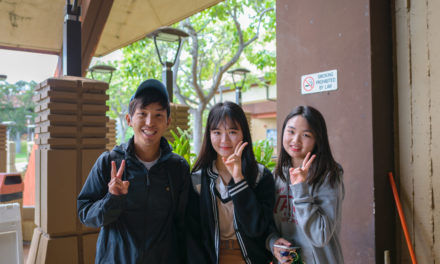BY ESTEFANIA MAGDALENA | STAFF WRITER
Leaving the comfort zone and embarking on adventures towards a new challenge will always make us grow. At the same time, it is also true that it is necessary to be prepared, so in this article we tell you the challenges that you will have to face once you decide to be an international student in Hawai‘i or any other state.
Requirements to obtain a study visa: Processing a study visa requires months, money, and planning in advance. In my case, coming from Argentina, I thought it would be faster and easier to change my immigration status within the United States with the help of a lawyer, but the approximate cost was $1,000. Plus, it took 5 months for my application to get approved, so I had to make sure to get my paperwork done early. I always recommend returning to the country of origin, taking an appointment at the U.S. embassy at least a month in advance, and paying the $170 of the study visa.
Money: International students pay much more expensive fees than residents and citizens of the country, and it is mandatory to take 12 credits per semester as a minimum. Non-resident tuition at Kapi’olani Community College costs $8,280 per year ($4,140 per semester) full-time/12 credits or $345 per credit (versus the resident tuition of $131 per credit). To get the admission letter from the school you want to assist, it is also necessary to have sufficient financial support (an official bank statement or an affidavit of financial support of at least $22,000) to provide basic expenses such as housing, food, books, transportation, health insurance, and your social activities. A student visa in the U.S. does not allow you to work, so you are responsible to show the U.S. government that you do not need to work while you are studying.
Language: Since the master formula to learn is to practice, it will be essential that you feel encouraged to interact in class, even when you are embarrassed to make mistakes. What helped me to improve my level of English in college was to always have a dictionary in my backpack and write down in a notebook at least 20 words a day that I did not know the meaning. Excellence is not a skill; it is an attitude.
The cultural shock: Being an international student exposes you to a diversity of people, situations, and places. It was difficult for me to adapt to being constantly surrounded by Asian food shops here on Oʻahu because there are hardly any in my country. Thanks to college, I was able to learn totally different cultures such as Japanese, Korean and Chinese. Now I have many friends of different nationalities, and I enjoy trying the favorite dishes of their nations.
Flight hours: Depending on the proximity of your country of origin, to the country in which you have chosen to study will be more or less difficult to return to. The jet lag, the change of sleep rhythm, or having to take several planes with stops in different countries are just a few situations that international students experience.
Difficulty in having a love relationship: In the case of being in a relationship with someone, you will have to face the physical distance and the fact of living at different times. On the other hand, if you are single, there is a chance that you fall in love with someone in the country you are studying.
The time difference: When we are having breakfast, people in our home countries are having dinner or even sleeping. This makes us have to be aware of the exact hours in which we can communicate with our loved ones so as not to lose daily contact.
Be away from your family and loved ones: Without a doubt, you will miss birthdays and important events in the lives of the people you love. Studying in another country requires dedication and time, so you have to accept that you will not be able to attend many of those special events.
Difficulties to work and study: Studying and attending class is our priority, so learn to organize. Many times, the time we should devote to study will be greater than what we can devote to having fun. If we add a part-time job (20 hours per week), we take on even greater the responsibilities.
Adaptation to another educational system: All countries have different evaluation systems and teaching techniques. In Argentina, my country of origin, evaluations are rated numerically from 1 to 10, and it is necessary to have at least a 60 percent on the exam correctly in order to pass. When I started studying in Hawaii, I had a hard time understanding what the credits were and even more, the value of the qualifications since they are alphabetical. It was very helpful to have access to the syllabus of each class to be able to guide myself about the meaning of the credits.
Whatever the challenge you face at the moment, being an international student is an experience that empowers you in all circumstances of life and enriches you as a person. The exposure of being an international student will make you gain a lot of confidence in yourself and tools to expand your future career opportunities worldwide.






